

Facebook, Twitter, Instagram, Pinterest – Complete Social Media Image Size Guide [INFOGRAPHIC] It doesn’t matter if you’re brand new to social media or a savvy, seen-it-done-it-all veteran – when it comes to setting up a new Twitter Profile or Facebook Page, working out the heights and widths of all those images you positively need to make your channels look fantastic is a time-consuming and, unfortunately, regrettably forgettable business.
![Facebook, Twitter, Instagram, Pinterest – Complete Social Media Image Size Guide [INFOGRAPHIC]](http://cdn.pearltrees.com/s/pic/th/instagram-infographic-106630592)
And what about those other social platforms, such as Google+, Pinterest, LinkedIn, Instagram and YouTube? Wouldn’t it be really convenient if somebody put all this information within one, easy-to-read image? Well, fret no more, fact fans. Facebook best practices for education - connecting to school communities with facebook. Will Facebook profiles replace govt web sites? Citizen Engagement, Policy.
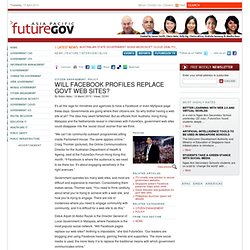
Social Plugins. Why I’ve deleted my Facebook account. Open Graph Protocol / Facebook Platform.
Facebook Pages. Facebook loses 6M U.S. users in May - Web 2.0 and Web Apps, internet, Facebook, e-commerce - CIO. News June 13, 2011 02:21 PM ET Computerworld - Facebook may continue to gain users, but the world's biggest social network isn't gaining them as quickly as it has been and is actually losing users in the U.S.
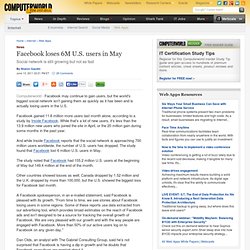
Facebook gained 11.8 million more users last month alone, according to a study by Inside Facebook. While that's a lot of new users, it's less than the 13.9 million new users who joined the site in April, or the 20 million gain during some months in the past year. And while Inside Facebook reports that the social network is approaching 700 million users worldwide, the number of U.S. users has dropped. The study noted that Facebook had 155.2 million U.S. users at the beginning of May but 149.4 million at the end of the month.
Other countries showed losses as well; Canada dropped by 1.52 million and the U.K. dropped by more than 100,000, but the U.S. showed the biggest loss for Facebook last month. BBC punches holes in Facebook with virtual bagel stunt. The BBC has conducted a test to show that Facebook ‘likes’ generated from sponsored ad placements within the social network may be of little value unless tightly targeted.
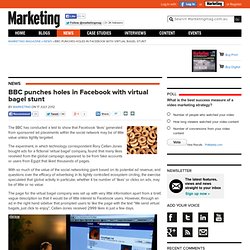
The experiment, in which technology correspondent Rory Cellan-Jones bought ads for a fictional ‘virtual bagel’ company, found that many likes received from the global campaign appeared to be from fake accounts or users from Egypt that liked thousands of pages. With so much of the value of the social networking giant based on its potential ad revenue, and questions over the efficacy of advertising in its tightly controlled ecosystem circling, the exercise speculated that global activity in particular, whether it be number of ‘likes’ or clicks on ads, may be of little or no value.
Making social media work professionally. PC Hanif Sanghar was so pleased to have been involved in an operation to catch two vicious attackers that he tweeted he had "arrested the offenders", even though the suspects had yet to stand trial.
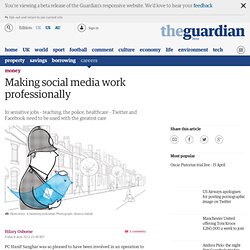
The tweet was deleted and he was reprimanded. Doctors and nurses at a hospital in Swindon were suspended after posting pictures of themselves lying face down on resuscitation trolleys, ward floors and on the Wiltshire air ambulance helipad on Facebook as part of an internet craze called "the lying down game". And in America teacher Ashley Payne lost her job after a parent spotted a Facebook picture of her with a glass of wine in one hand and a beer in the other.
Reading these stories could give you the impression that there are certain careers where using social media is a recipe for disaster. But while much has been made of the benefits of tools such as Twitter and Facebook to the corporate world, there are advantages to using them in other more sensitive jobs. The tweeting teacher. Liability For User Generated Content on Facebook.
This means that advertisers are responsible for ensuring that all content on their promotional Facebook pages is in compliance with the Advertiser Code of Ethics, including content uploaded to the advertiser’s pages by other Facebook users.
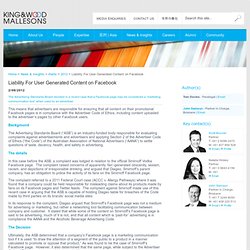
Background The Advertising Standards Board (“ASB”) is an industry-funded body responsible for evaluating complaints against advertisements and advertisers and applying Section 2 of the Advertiser Code of Ethics (“the Code”) of the Australian Association of National Advertisers (“AANA”) to settle questions of taste, decency, health, and safety in advertising. The details. Facebook for Beginners. Update: This post was updated October 2013 to reflect current statistics and tools.
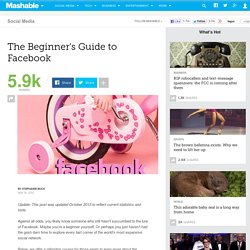
Against all odds, you likely know someone who still hasn't succumbed to the lure of Facebook. Maybe you’re a beginner yourself. Or perhaps you just haven’t had the gosh darn time to explore every last corner of the world’s most expansive social network. Below, we offer a refresher course for those eager to learn more about the basics of Facebook. Let’s take a social stroll through the network’s main features, policies and culture norms. How Schools Can Use Facebook to Build an Online Community. David Hartstein is a partner at Wired Impact, a web design company that builds websites for nonprofits.
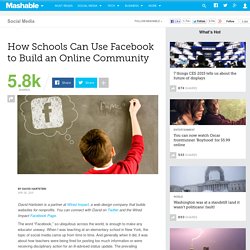
You can connect with David on Twitter and the Wired Impact Facebook Page. The word “Facebook,” so ubiquitous across the world, is enough to make any educator uneasy. In Education - common questions (resources) Facebook Privacy Scanner. Social Networks: Should Teachers be on it? By Jamie Kalicharan and Rose Calles. Social Networks: Should Teachers be on it?
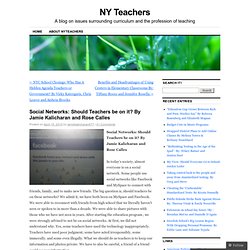
By Jamie Kalicharan and Rose Calles In today’s society, almost everyone is on a social network. Some people use social networks like Facebook and MySpace to connect with friends, family, and to make new friends. The big question is, should teachers be on these networks?